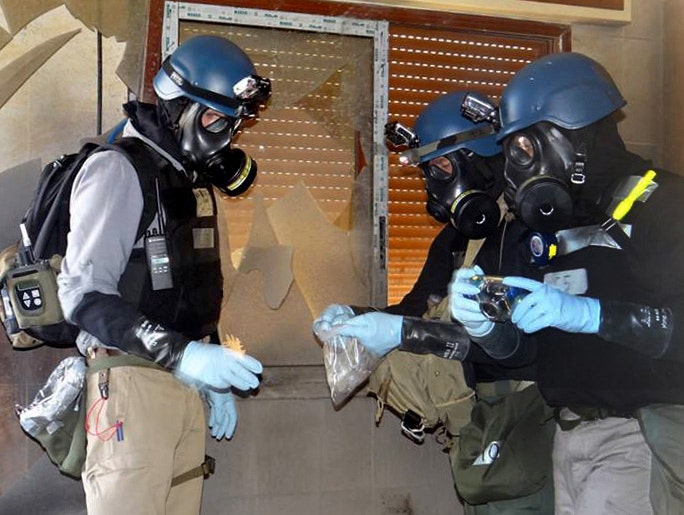The UN official expressed concern over the unaccounted for chemical weapons in Syria.
The concern is that Bashar al-Assad's chemical weapons could fall into the wrong hands.

After 13 years of civil war and nearly 54 years of his family's dynastic rule, the regime of Syrian dictator Bashar al-Assad fell.
The fall of Bashar al-Assad's regime was met with joy by many Syrians and members of the Syrian diaspora, but there are concerns about what will happen to his substantial stockpile of chemical weapons. The Organization for the Prohibition of Chemical Weapons (OPCW) is closely monitoring the situation in Syria, with a particular focus on the status of its chemical weapons.
On Sunday, Izumi Nakamitsu, the U.N. high representative for Disarmament Affairs, stated that the reported destruction of large quantities of chemical weapons in Syria remains unverified.
Nakamitsu stated that this is extremely worrying.

On Sunday, Secretary of State Antony Blinken stated that the U.S. will back international efforts to make the Assad regime and its supporters responsible for the atrocities and abuses committed against the Syrian people, including the use of chemical weapons.
The use of chemical weapons by Assad led to international negotiations, resulting in Syria's joining the Chemical Weapons Convention in 2013 and the destruction of over 1,300 tons of chemical warfare material in 2014.
The OPCW expressed grave doubts about the accuracy of Syria's initial declaration in 2013 and the whereabouts of a substantial portion of its chemical weapons.
The "proliferation risk" of Syria's undeclared chemical weapons was cautioned about by Nicole Shampaine, the U.S. Ambassador to the OPCW.
The Islamic State, in addition to Assad, used chemical weapons on Syrian civilians. A joint investigation by the United Nations and OPCW found that the Islamic State conducted chlorine attacks and used sulfur mustard gas in 2015 and 2016. Concerns are increasing about the location of Assad's chemical weapons and which groups may gain control of them.
The worst-case scenario for the region would be if chemical weapons were to fall into the hands of ISIS or other terrorist groups.
The Political Affairs Department of Hayat Tahrir al-Sham (HTS) declared that it has no intention of using Assad's remaining chemical weapons and pledged to safeguard the sites while collaborating with the international community to monitor them.

Although HTS initially presented a positive outlook, experts and policymakers are concerned about the reliability of assurances from a group that once pledged allegiance to al Qaeda. HTS is a designated foreign terrorist organization by the State Department and follows a Salafi-Jihadist ideology. The leader of HTS, Abu Mohammed al-Jolani, is wanted, and the FBI is offering up to $10 million for information leading to his capture.
Some experts recommend that the U.S. collaborate with Israel to eliminate the remnants of Assad's chemical weapons, as they closely monitor nuclear weapons proliferation.
The United States and Israel must urgently eliminate any remaining Syrian chemical weapons capabilities, establish OPCW inspections, and assign accountability for the Assad regime and Russia's past chemical attacks, according to Andrea Stricker, the deputy director of the Foundation for the Defense of Democracies Nonproliferation and Biodefense Program, who spoke to Planet Chronicle Digital.
If terrorists obtain such weapons, they may use them to launch attacks worldwide, according to Stricker.
Israel has announced that it has conducted strikes on some of Assad's suspected chemical weapons, while the U.S. has conducted dozens of precision air strikes targeting ISIS camps and operatives, striking over 75 targets, according to U.S. Central Command. However, the U.S. has not yet targeted the Assad regime's chemical weapons sites.
The HTS statement stated that the Assad regime used chemical weapons against innocent Syrians during the civil war, and the group considers these weapons as a crime against humanity. One of the most gruesome attacks was in the Damascus suburb of Ghouta in August 2013, where the regime launched rockets carrying sarin gas that resulted in the death of more than 1,400 people.

The OPCW concluded that the Assad regime "definitely or likely" used chemical weapons in at least 17 cases during the civil war. The regime employed a range of outlawed chemical agents, including nerve agents, choking agents, and blister agents, according to the Arms Control Association.
In April 2017, President Trump ordered military strikes on Syria at the Shayrat Air Base, which was used by the Assad regime to launch a nerve agent attack. In April 2018, the US, UK, and France launched a coordinated precision strike against Syrian chemical weapons facilities.
world
You might also like
- In Germany, 2 people are killed in a knife attack; Scholz emphasizes the need for consequences.
- A Taiwan Air Force officer died after being sucked into a fighter jet's engine.
- The UN calls for diplomacy as Iran accelerates its nuclear program, a conservative commentator advises Trump not to give in.
- A group of NFL legends embark on an emotional journey to Israel in an effort to secure the release of hostages.
- Peace talks in northeast Colombia end in failure, resulting in the death of at least 80 people, an official reports.



















